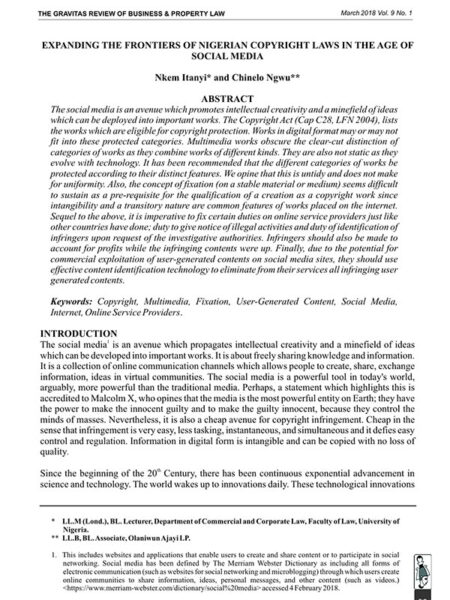-
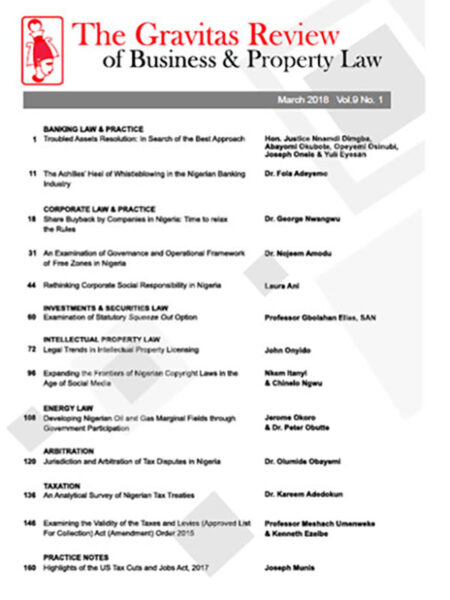
The Gravitas Review of Business & Property Law Vol.9 No.1 – E-Book
0₦5,000.00In this issue of The Gravitas Review of Business & Property Law Vol.9 No.1, there are well researched articles on:
- Banking Law & Practice
- Corporate Law & Practice
- Investments & Securities Law
- Intellectual Property Law
- Energy Law
- Arbitration
- Taxation
- Practice Notes
-

The Gravitas Review of Business & Property Law Vol.9 No.1
0₦5,000.00In this issue of The Gravitas Review of Business & Property Law Vol.9 No.1, there are well researched articles on:
- Banking Law & Practice
- Corporate Law & Practice
- Investments & Securities Law
- Intellectual Property Law
- Energy Law
- Arbitration
- Taxation
- Practice Notes
-
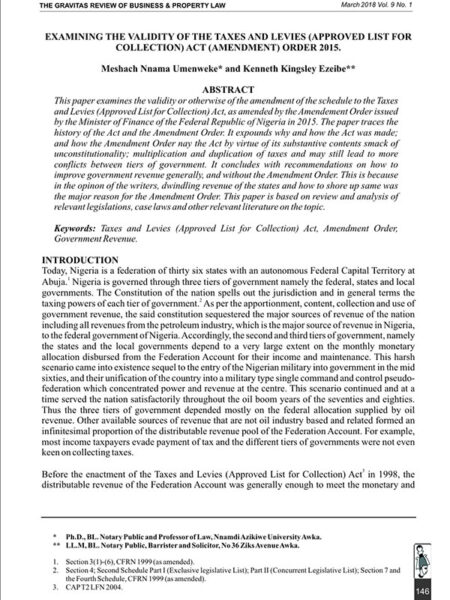
Examining the Validity of the Taxes and Levies (Approved List For Collection) Act (Amendment) Order 2015
0₦2,500.00Professor Meshach Umenweke of the Nnamdi Azikiwe University Awka, and Kenneth Ezeibe, legal practitioner, in their article “Examining the Validity of the Taxes and Levies (Approved List For Collection) Act (Amendment) Order 2015”, consider whether the Minister of Finance has the vires to amend the Schedule to the principal Act, and whether the items listed in the Order are consistent with the legislative and taxing powers of each tier of government under the Constitution.
-
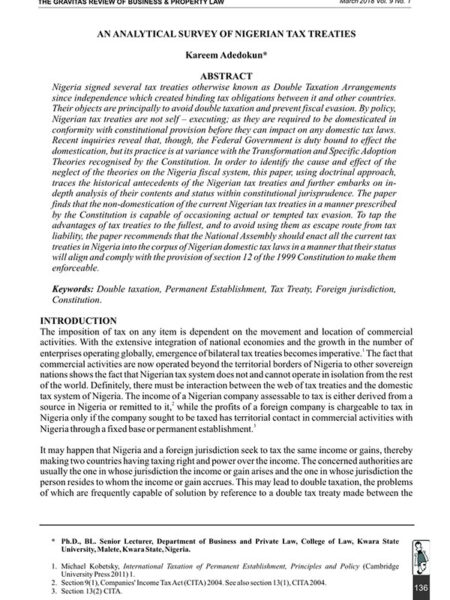
An Analytical Survey of Nigerian Tax Treaties
0₦2,500.00Dr. Kareem Adedokun, Senior Lecturer, Department of Business and Private Law, Kwara State University, in “An Analytical Survey of Nigerian Tax Treaties”,explains that Nigeria has since Independence, signed several tax treaties which created binding tax obligations between it and other countries. The objects of the treaties are principally to avoid double taxation and prevent fiscal evasion. He argues that the non-domestication of the tax treaties in a manner prescribed by the Constitution is capable of occasioning actual or tempted tax evasion. He recommends the domestication of the treaties to take full advantage of them, and to avoid them being used to escape tax liability.
-
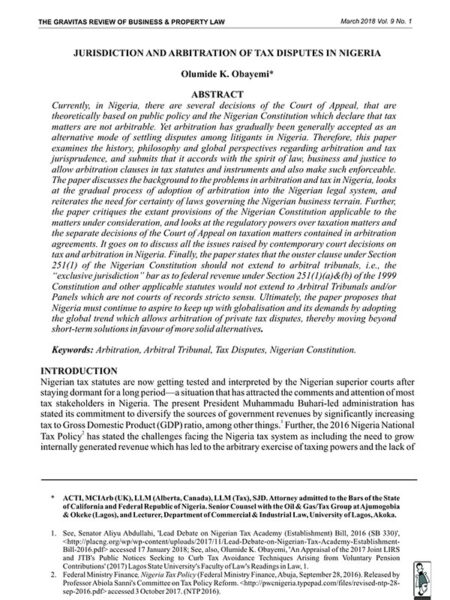
Jurisdiction and Arbitration of Tax Disputes in Nigeria
0₦2,500.00Dr. Olumide Obayemi, of the Department of Commercial & Industrial Law, University of Lagos, and of & Okeke, in his article, “Jurisdiction and Arbitration of Tax Disputes in Nigeria” observes that currently, based on public policy and the Constitution, tax matters are not arbitrable. He examines the history, philosophy and global perspectives regarding arbitration and tax jurisprudence, and submits that it accords with the spirit of law, business and justice to allow arbitration clauses in tax statutes. He reviews the decisions of the Court of Appeal on taxation matters contained in arbitration agreements, and submits that the exclusive jurisdiction conferred on the Federal High Court by Section 251(1)(a)&(b) of the 1999 Constitution should not bar arbitral tribunals which are not courts of records stricto sensu. He concludes that Nigeria must continue to aspire to keep up with and its demands by adopting the global trend which allows arbitration of private tax disputes.
-
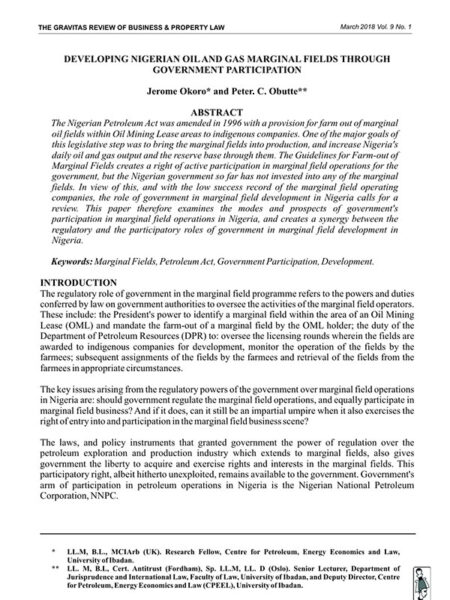
Developing Nigerian Oil and Gas Marginal Fields through Government Participation
0₦2,500.00Jerome Okoro and Dr. Peter Obutte, of the Centre for Petroleum, Energy Economics and Law, University of Ibadan in their article, “Developing Nigerian Oil and Gas Marginal Fields through Government Participation”, define what qualifies as a marginal field and note that the 1996 amendment to the Petroleum Act provides for farming out of marginal oil fields within Oil Mining Lease areas to indigenous companies. A major goal of the law was to bring the marginal fields into production, and increase Nigeria’s daily oil and gas output and the reserve base through them. Though the Guidelines for Farm-out of Marginal Fields creates a right of active participation in marginal field operations for the government, the Nigerian government so far has not invested into any of the marginal fields Okoro and Obutte undertake a review of the Nigerian marginal field development program, the legal basis of regulatory role of government, structure of Nigerian petroleum operations and expected reforms under the Petroleum Industry Governance Bill, 2017.
-
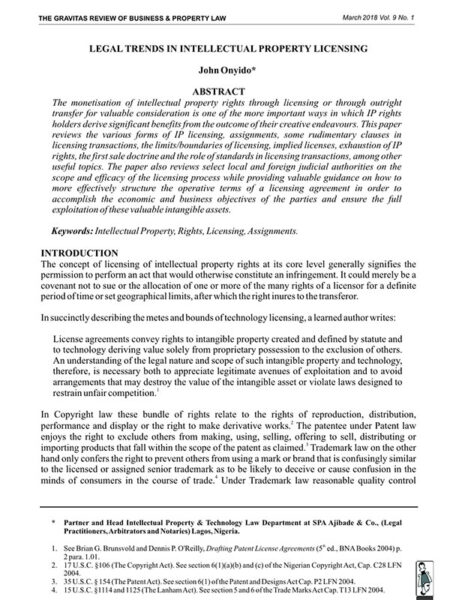
Legal Trends in Intellectual Property Licensing
0₦2,500.00John Onyido, Partner, SPA Ajibade & Co in his article, “Legal Trends in Intellectual Property Licensing”observes that the monetisation of intellectual property rights through licensing or through outright transfer for valuable consideration is one of the more important ways in which IP rights holders derive significant benefits from their creative. John reviews the various forms of IP licensing, assignments, some rudimentary clauses in licensing transactions, the limits/boundaries of licensing, implied licenses, exhaustion of IP rights, the first sale doctrine and the role of standards in licensing transactions, among others. He considers select local and foreign judicial authorities on the scope and efficacy of the licensing process while providing valuable guidance on how to more effectively structure the operative terms of a licensing agreement in order to accomplish the objectives of the parties.
-
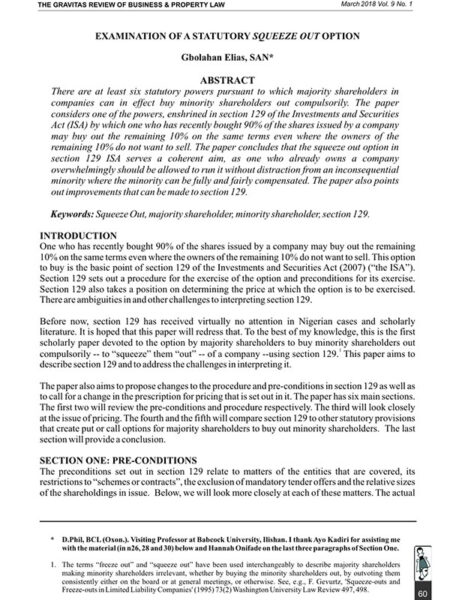
Examination of a Statutory Squeeze Out Option
0₦2,500.00Professor Gbolahan Elias, Chairman, Lagos State Law Reform Commission, and Partner G. Elias & Co in his article, “Examination of a Statutory Squeeze Out Option”, notes that there are at least six statutory powers pursuant to which majority shareholders in companies can in effect buy minority shareholders out compulsorily. He considers one of the powers enshrined in section 129 of the Investments and Securities Act (ISA) by which one who has recently bought 90% of the shares issued by a company may buy out the remaining 10% on the same terms even where the owners of the remaining 10% do not want to sell. He concludes that the squeeze out option in section 12 ISA is, as one who already owns a company overwhelmingly should be allowed to run it without distraction from an inconsequential minority where the minority can be fully and fairly compensated.
-
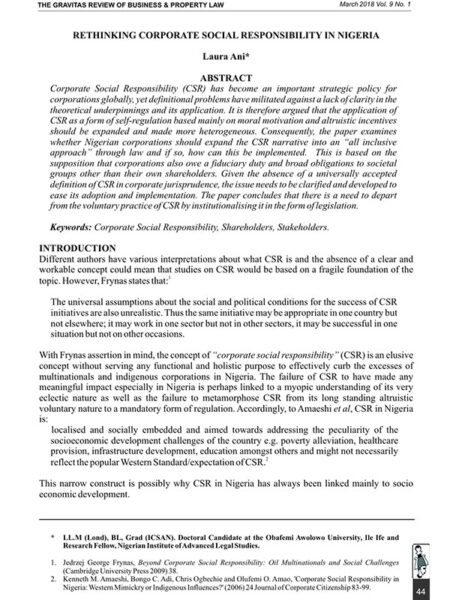
Rethinking Corporate Social Responsibility in Nigeria
0₦2,500.00Laura Ani, Research Fellow, Nigerian Institute of Advanced Legal Studies, in her article, “Rethinking Corporate Social Responsibility in Nigeria”, argues that the application of CSR as a form of self-regulation based mainly on moral motivation and altruistic incentives should be reappraised. She examines the Shareholder Primacy and Stakeholder Communitarianism approaches to CSR, the statutory framework for CSR in Nigeria and how other jurisdictions have treated the issue of CSR. She concludes that there is a need to depart from the voluntary practice of CSR by institutionalising it in the form of legislation.
-
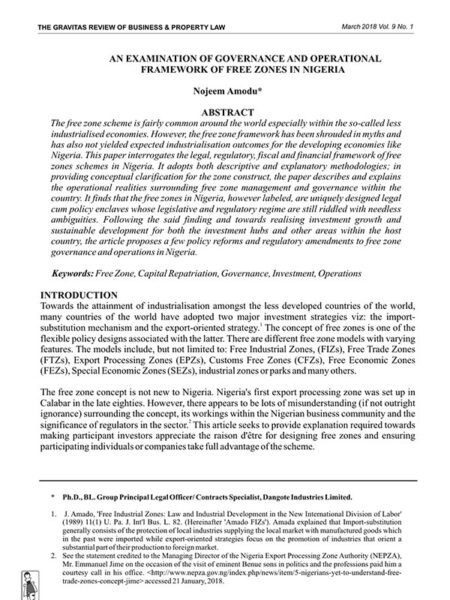
An Examination of Governance and Operational Framework of Free Zones in Nigeria
0₦2,500.00Dr. Nojeem Amodu, Group Principal Legal Officer with Dangote Industries Limited, in “An Examination of Governance and Operational Framework of Free Zones in Nigeria”,interrogates the legal, regulatory, fiscal and financial framework of free zones schemes in Nigeria. He notes different free zone models including Free Industrial Zones, Free Trade Zones, Export Processing Zones, Customs Free Zones, Free Economic Zones, Special Economic Zones among others. He considers the reasons for delineation of zones, licensing and incentive regimes of free zones in Nigeria, registration procedure and examines all sides of the argument in the debate on the conflict between the Nigeria Export Processing Zones Act (NEPZA) and the Oil and Gas Export Free Zone Authority Act (OGEFZA).
-
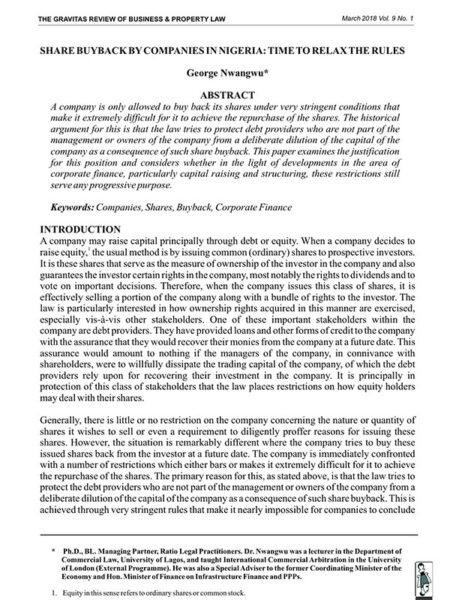
Share Buyback by Companies in Nigeria: Time to Relax the Rule
0₦2,500.00Dr. George Nwangwu, Managing Partner, Ratio Legal Practitioners, and Special Adviser to the ex-Minister of Finance on Infrastructure Finance and PPPs, in his article, “Share Buyback by Companies in Nigeria: Time to Relax the Rules” notes that a Nigerian company is allowed to buy back its shares under very stringent conditions that make it extremely difficult for it to achieve the repurchase of the shares. The historical argument for this is the protection of debt providers, who are not part of the management or owners of the company, from a deliberate dilution of the capital of the company as a consequence of such share buyback. He examines the justification for this position and considers whether in the light of developments in corporate finance, particularly capital raising and structuring, these restrictions still serve any useful.
The Gravitas Review of Business & Property Law

